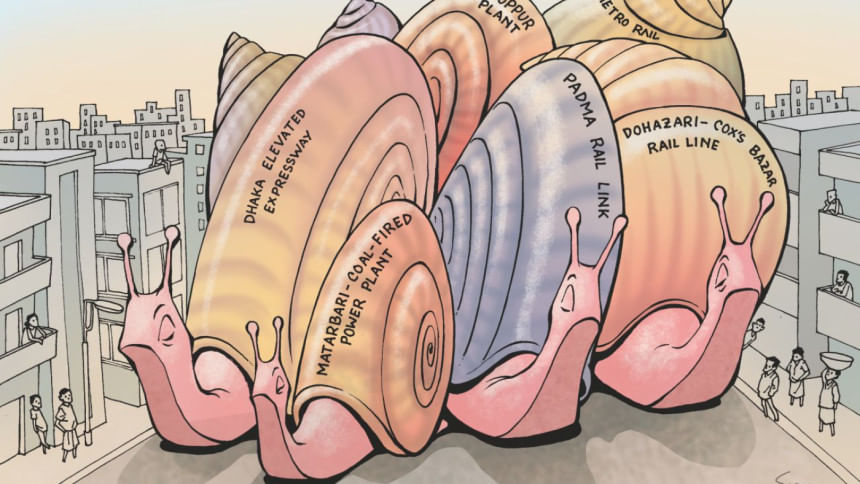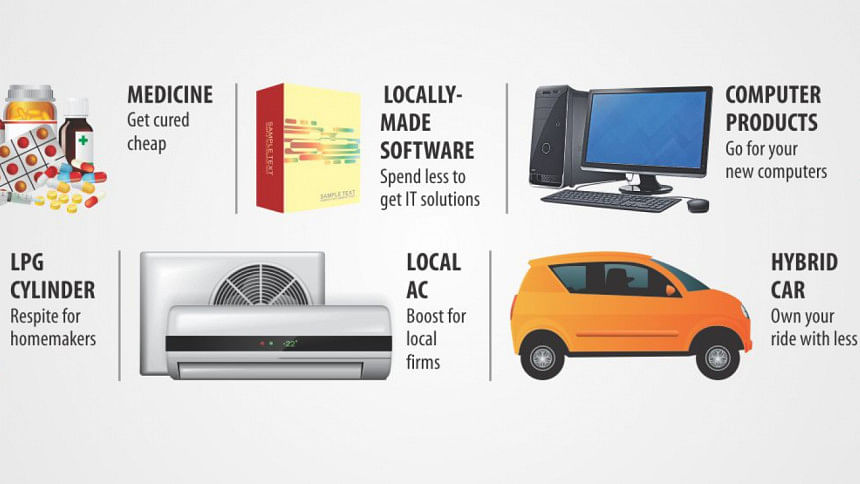Go slowly, get costly

Be it construction of a road, a sea port or a power plant, almost all projects go through delays and cost escalations, a problem that does not only hold back economic growth, but create scope for corruption as well.
The core reason behind this is said to be the inefficiency of those involved from planning to implementation. In most cases, budget allocations for these projects could not be spent.
Still, the government proposed Tk 30,614 crore (one-fifth of total ADP) for six mega projects in 2017-18.
Over the last several years, the government took up development projects but failing to implement many of them on time.
With a view to implement projects quickly, the government took up "Fast Tract Projects" in 2014 and primarily listed six mega projects for quick implementation.
Most of these projects, however, are far behind schedule. And the exception is Padma Bridge.

Forty-three percent of the total work of the bridge has so far been completed and when all is done, the bridge is expected to add 1 percent to the GDP.
The other projects have seen less than 10 percent progress.
President of Dhaka Chamber of Commerce and Industry (DCCI) Abul Kasem Khan believes implementation of the mega projects would hugely improve the country's infrastructure, increase energy and export-import that will significantly boost the GDP.
"Considering this potential, the government must give special importance to implementation of the projects," he said, proposing the formation of a national project implementation authority involving the private sector. He stressed learning from China, India or any nation's implementation of large projects.
Prime Minister Sheikh Hasina took the helm of the fast track projects -- Padma Bridge, a deep sea port, Metro Rail, 1,320MW Rampal Power Plant, 2,000MW Rooppur Nuclear Power Plant, and the LNG Terminal for importing liquid gas.
She had instructed all concerned to execute the projects timely and let those not get stuck in red tape that eats up time.
Over the years, more projects were included in the fast track initiative and the government separately allocated Tk 18,727 crore for eight such projects last year.
Finance Minister AMA Muhith has been pouring money into the projects and he agrees with experts and economists about their importance. He termed the fast track projects "growth stimulating" and assured financing of these projects on priority basis and their close implementation monitoring.
The intention is clear; the government wants to make progress of the projects visible before the next parliamentary election at the end of 2018.
Yet, Muhith did not say anything about how implementation pace will be ensured and how the efficiency of project officials would be improved, something experts said was key.
Prof Shamsul Hoque, who is involved in a number of infrastructure projects, said time extension of projects was causing cost escalations and this had become common for Bangladesh.
Pointing to the lack of efficiency in handling mega projects, the teacher of Buet's civil engineering department said, "When projects are taken, everyone assumes the officials will be able to handle it smoothly, land will be acquired easily but it does not happen in the implementation stage."
Overall, most of the mega projects have now been delayed by two to four years. Some of them may face even more delays.
For instance, the prime minister inaugurated the Payra Sea Port project in 2013 and the project was included in the fast-track initiative in January 2015, with an aim to have it completed in 2021.
The project saw hardly any progress, apart from the signing of three MoUs.
The fate of Padma rail link project is similar. The project was still at the primary stage as its finance was yet to be managed. This delay means no train operation via the Padma Bridge when it opens.
There are also projects that were taken some years ago but were yet to kick off. Dhaka Elevated Expressway is a glaring example. Hasina inaugurated the construction work of the 21km expressway 2013 but the project's fate is still uncertain as its financier could not be finalised.
Constructions of Metro Rail in the capital, Bus Rapid Transit (BRT) from Gazipur to Airport and Dohazari (Chittagong)-Gundum rail track are also facing delays.
Asked about the impacts of delays and cost escalations of the projects, Iftekharuzzaman, executive director of Transparency International, Bangladesh, said delays in project implementation, especially in case of infrastructure projects, was a perennial problem in the public sector governance in Bangladesh.
It could be partly attributed to the inefficiency of those involved in project design and implementation, he said.
“But more often it can also be the outcome of deliberate and rather convenient scheme of profiteering in which implementing contractors collude with a section of relevant officials and influential rent-seekers,” he said.
The TIB official said, “The end-result is unwarranted increase in per-unit cost of infrastructure projects which is already one of the highest by global standards. The irony is that the burden of all these is borne by the common people of the country who have nothing to do with the reasons behind the increased costs and loss to the economy.”
Despite the frustrating picture of mega projects, Principal Secretary to the Prime Minister's Office Kamal Abdul Naser Chowdhury was hopeful about progress of the projects and their benefits.
"Capacity development is crucial for any project implementation. We are putting emphasis on it through training the officials to increase their capacity," he told The Daily Star, claiming that the pace of execution of the projects was much better now than before.

 For all latest news, follow The Daily Star's Google News channel.
For all latest news, follow The Daily Star's Google News channel. 



Comments